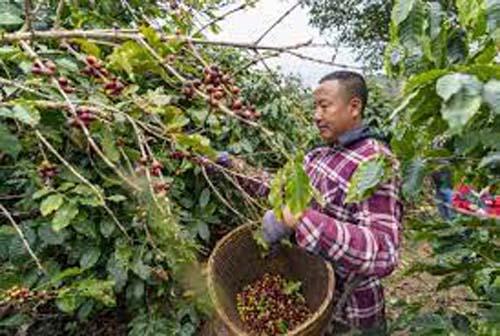
History of world coffee development makes a U-turn in China
Ding Gang
When I worked in Latin America several years ago, I deeply understood the relationship between coffee cultivation, the local economy and social patterns. Many coffee-producing countries still bear the slavery dregs brought by the colonizers, which has restricted the change of the economic development of these countries, continuing the legacy of coffee development, in which the poor are getting poorer and the rich are getting richer. The bitter history of Latin America is all concentrated in a cup of coffee.

After I returned to China, I drank a cup of Arabian coffee from China’s Yunnan Province in a cafe in Beijing, and when the refreshing flavor touched my taste buds, I thought of the history of coffee.
The history of coffee is a history of globalization, a part of the history of poor countries getting poorer, rich countries getting more prosperous, or poor people remaining poorer and rich people getting richer.
Since coffee was discovered by an Ethiopian shepherd around 850 CE, it has been an important part of the West’s history of global colonial expansion. It is still profoundly influencing the development of many countries today.

A closer look at the history of coffee development over the past five or six hundred years shows that this plant, which can give people mental stimulation, has formed a vast network worldwide, creating a group of wealthy capitalists. Still, the cruel exploitation of coffee farmers in many countries remains, resulting in continuous poverty and unrest. Many generations of coffee growers are still destitute in the Latin American countries where I have worked.
A recent encounter with a local coffee grower in Yunnan convinced me that the world history of coffee has taken a U-turn in China.
In Menglian county, in southwestern Yunnan, I walked into a roadside B & B where I wanted lunch, saw a pour-over coffee, and asked for a cup. The waiter told me this was home-grown coffee from their coffee estate, LIZUK. When I checked online, it turned out that this coffee estate had been included in Yunnan’s boutique coffee estates list. The coffee it produces is supplied to major coffee merchants and sold to major cities such as Beijing, Shanghai and Guangzhou.
During the conversation, I learned that coffee farming in Menglian represents agricultural development and is an important path for local farmers to get out of poverty.

Coffee in Yunnan is an exotic product brought by Western colonists; a French missionary brought coffee seeds to the country in 1892. There was a period of large-scale cultivation in Yunnan in 1958, but it soon retreated. It was not until 1997 that coffee cultivation peaked, at one point reaching 85 percent of all coffee grown in China.
With China’s reform and opening-up, Nestle began to develop coffee projects in Yunnan, and the history of coffee development in China was finally brought in line with the world. However, coffee’s story took a unique Chinese path.
The world’s foremost coffee companies profited by entering China, and China’s poor growers likewise benefited. The market for coffee in China is becoming larger and larger, and Chinese growers are profiting more and more as they emerge from generations of poverty.
Coffee is one of the key projects supported and developed by Menglian county and its municipal government, along with tea, kiwifruit, and many more products known worldwide.
The government’s input has enabled coffee growers to develop fine coffee creatively. This is where the focus of China’s precision poverty alleviation lies. Local friends told me that farmers who specialize in coffee now earn an average annual income of more than $10,000.
Data shows that the per capita disposable income of urban residents in Menglian county was 9,782 yuan ($1,415) in 2010 and reached 22,278 yuan in 2022.
At the same time, “Menglian Fine Coffee” is gradually emerging in the domestic coffee market with its unique flavor and excellent quality.
I heard that France has now started to import Yunnan’s coffee, and Chinese coffee into the world’s boutique series is only a matter of time.
To better understand the global history of coffee development in China’s turn, let’s compare this to the situation in Guatemala, a major coffee-producing country.
Guatemala has been one of the world’s most crucial coffee production countries for hundreds of years, and Guatemala’s coffee is also the coffee that Americans drink the most. However, World Bank data for 2019 suggested that about?54 percent?of the population in Guatemala?was below the poverty line.
Since colonizers globalized coffee, most of the world’s coffee beans have been grown in poor countries where a large percentage of coffee farmers have been affected by poverty for two to three centuries.
But China’s farmers, who have been lifted out of poverty with the government’s support, are raising their living standards and making Chinese coffee available to the world through their hard work.
The writer is a senior editor with People’s Daily, and currently a senior fellow with the Chongyang Institute for Financial Studies at Renmin University of China
